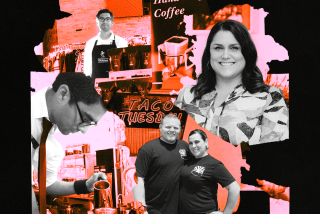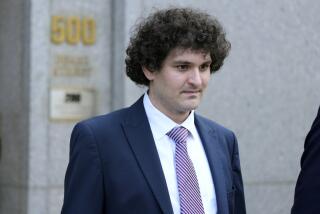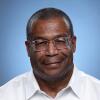How I Made It: Ryan Disraeli’s TeleSign helps prevent online fraud, one PIN at a time
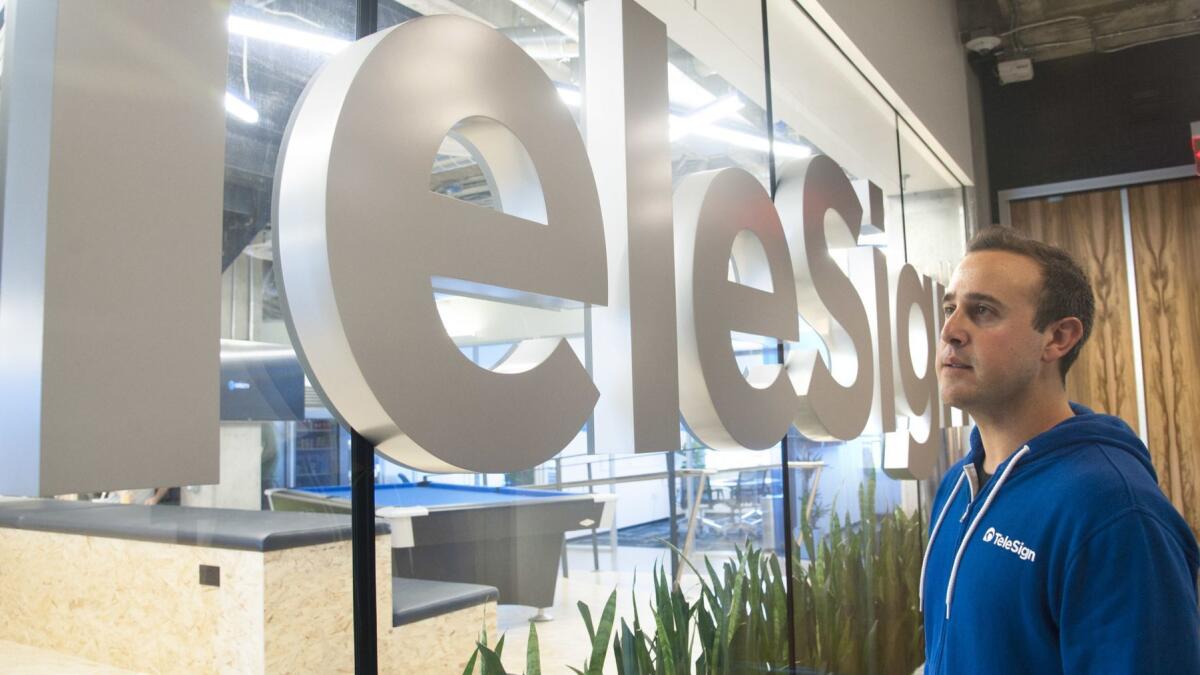
Ryan Disraeli, 31, is one of the three co-founders of TeleSign, a Marina del Rey company that provides user identification software for things such as two-factor authentication services — requiring an additional personal ID number sent to one’s smartphone, for example — to help block fraudulent users at some of the world’s largest websites. TeleSign customers include Twitter, Facebook, Google’s Gmail, Microsoft Outlook, Bank of America and PayPal. The company, which began in 2005 with just Disraeli and co-founders Stacy Stubblefield and Darren Berkovitz, now has more than 300 employees. It generated more than $100 million in sales during the last full year of operations before it was acquired by Belgian telecommunications firm Belgacom International Carrier Services in 2017 for $230 million. Disraeli has served as chief executive of TeleSign since December 2018.
Find your own path
Disraeli grew up in San Diego and decided early on that he wasn’t suited for the path of his ancestors, who were seriously involved in dental hygiene. He graduated magna cum laude from USC’s Marshall School of Business, focusing on entrepreneurship and advertising.
“I came from a family of dentists, like four generations of dentists,” Disraeli said. “I loved the business part — I mean dentists typically own their own practice — but certainly not the part about looking in people’s mouths all day. Unfortunately, the dental dynasty in the family has died. I have two brothers, and all three of us are in tech.”
Bonding
Good partners are vital to most successful businesses, and TeleSign is no exception. Disraeli, Stubblefield and Berkovitz are all USC alumni who met while working at a business incubator in Beverly Hills.
“Our personalities and strengths are different,” Disraeli said. “Stacy is very forward-thinking and one of the smartest people I’ve certainly worked with and highly technical. Darren is extremely sales and business development-oriented and an eternal optimist. I fall somewhere in the middle of them where I’m more of an operator. The three of us really united very early on and I think built a lot of trust around those ups and downs in the early part of the business.” Berkovitz has since left the company. Stubblefield is TeleSign’s chief innovation officer.
The big idea
The trio had several ideas for a possible business, but the one that seemed most promising would later become TeleSign.
“The real need we saw was a solution to online fraud,” Disraeli said, “everything from spam on the internet to hacked accounts. It was more of a theoretical problem than the headline-grabbing crisis that we have today. We were really the innovators in that space, the first to have a commercial product whereby you’d send a text message or a voice call with a code to verify your identity.”
The big problem
Customers didn’t exactly flock to TeleSign’s door. First off, online fraud wasn’t such a huge problem at the time, and companies didn’t know how important it would later become, Disraeli said. But the other problem that frequently surfaced came during the due diligence phase of checking out TeleSign’s credentials.
“They would realize that we were three young kids basically running a start-up,” Disraeli said. “We really struggled getting past that. We would go through the entire sales process and get to the very end and run into challenges where companies would realize how small we were and how important we were going to be to their infrastructure, and they couldn’t take that risk.”
Rejected
In the early days of the company, Disraeli said, “we couldn’t afford to go buy a booth at a conference, and so we would go walk the halls of conferences. Most of the feedback we got was ‘Nobody would ever use this technology’ and ‘This will never be successful.’ There was tons of negative feedback early on.”
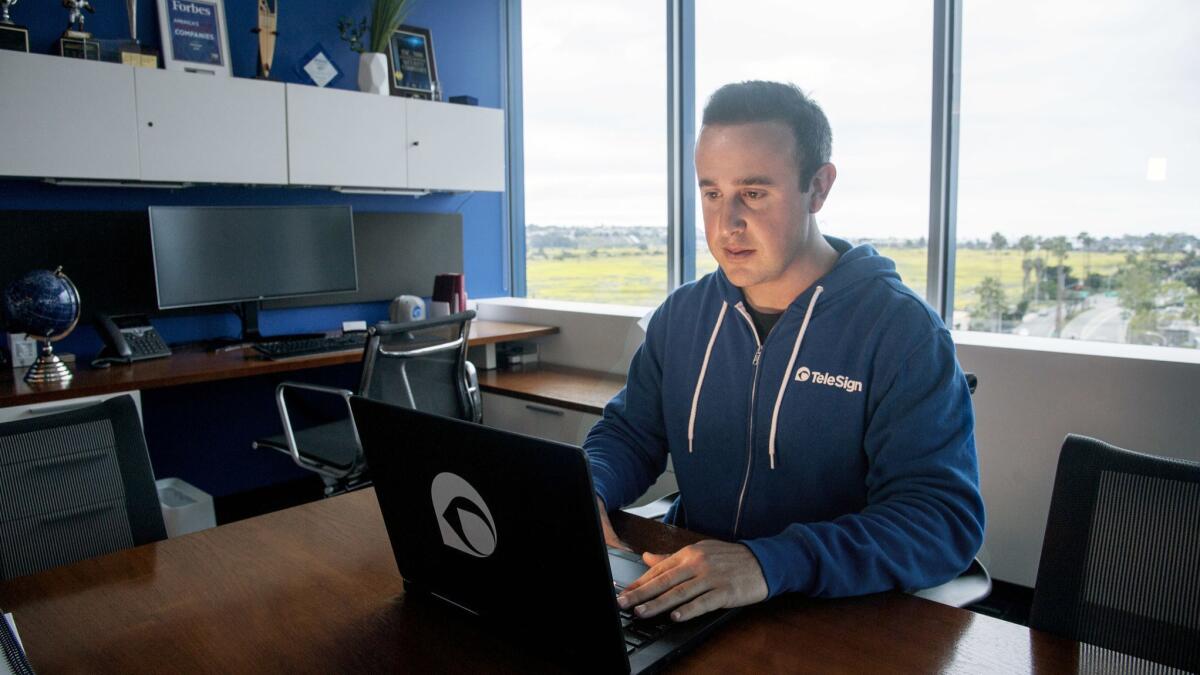
The big break
The trio kept plugging away in spite of all the negative responses, Disraeli said. TeleSign finally got its first big break in 2007 when a top online marketplace said yes to its pitch. The customer had only 20 employees, meaning it wasn’t big enough, Disraeli thinks, to have someone running deep due diligence checks.
“They signed up with us and saw a ton of success,” Disraeli said. “We were able to leverage that one large customer into acquiring others because they helped establish our credibility. It was persistence as well, continually focusing all of our attention on customer acquisition and listening to customers and innovating quite quickly.”
Listen carefully
“We wouldn’t go to a large company and tell them what to do,” Disraeli said. “We’d really listen to their challenges and try to be an extension of their team. We became extremely successful with our large-customer engagements, which is why nine of the top 10 U.S. websites use our services. We worked with them as opposed to just trying to sell them different solutions. Even to this day we spend a lot of time meeting customers in person. I’m still very much a believer in that.”
Global preparation
There are no one-size-fits-all solutions, Disraeli said, especially when the customer base is global.
“We have to have our services available in every country and every language and localized for the nuances of those different geographies. And so we very much think of ourselves as a global company. We’re also very strong in China, for example, and some other emerging markets.”
Tracking disruption
Disraeli says it is important to pay attention to people who are disrupting their industries. “Certainly, any of the leaders that think outside the box, like Richard Branson, who are constantly developing new markets and not staying in their same space. Modern day entrepreneurs like Elon Musk, for example, who has multiple business interests and is always trying to challenge the status quo and think differently. Those types of leaders are certainly ones that I like to read about and follow quite a bit.”
Personal
Disraeli’s success got him on the Forbes 30 Under 30 list in 2017. Along with his two co-founders, Disraeli received the 2018 USC Alumni Entrepreneur of the Year award.
With a severely limited amount of free time, Disraeli said he has found a way to parlay some fun and cultural enrichment from his business trips.
“I do a ton of international travel for TeleSign and I enjoy adding on a weekend in different places to really experience different cultures,” Disraeli said. “Last week, I was in China in four different cities for business, and then on the weekend, I went to Chengdu and visited the pandas and ate all the spicy Szechuan food I could find.”

